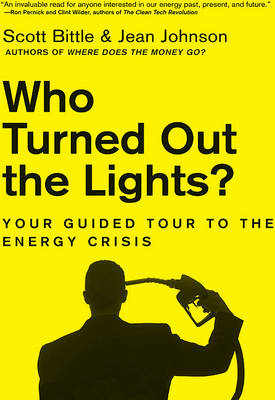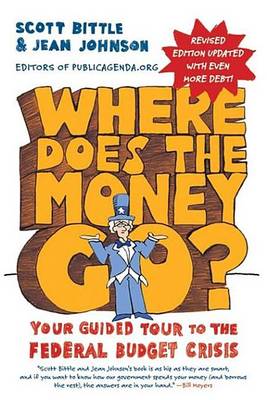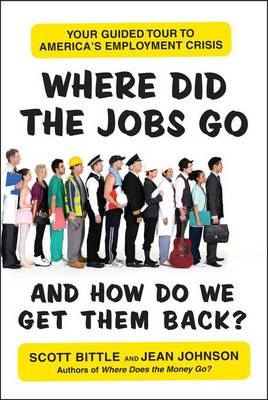Guided Tour of the Economy
4 total works
"A book that manages to be entertaining and irreverent while serving as an informative primer on a subject that is crucial to the future of all Americans." -New York Times Before you vote in a national election, you should ask yourself: Where Does the Money Go? The acclaimed and essential work by Scott Biddle and Jean Johnson has been updated to reflect the recent financial crisis and the sweeping legislation passed by the Obama administration in its first years. Nonpartisan and well-balanced, Where Does the Money Go? is a candid, eye-opening, and delightfully irreverent guide to the ongoing federal budget crisis that breaks-down into plain English exactly what the Fat Cats in Washington, D.C. are arguing about.
We are on the verge of a crippling energy crisis that could undermine our economy and change our way of life. In "Who Turned Out the Lights?", Scott Bittle and Jean Johnson, editors of the award-winning nonpartisan Web site PublicAgenda.org, offer a much-needed reality check. Neither 'Drill, Baby, Drill' nor 'Every Day is Earth Day' is an effective energy policy, and these kinds of ideological roadblocks have left us spinning our wheels for too long. If we don't get our act together and do something now, we'll be scrambling to get the energy we need to make life as we know it possible. But while the topic is serious, learning what you need to know about it doesn't have to be. Featuring chapters entitled 'Dam It: Hydroelectric Power' and 'Time for the Nuclear Option?' and sidebars like 'This little piggy went to market while this little piggy passed laws', this book will be anything but dry. By applying the same winning approach they used to irreverently explain the federal budget crisis in "Where Does the Money Go?"
, Bittle and Johnson will use pop culture to help define the fundamental concepts that shape the debate and explain the three risks we face: that we won't be able to afford the energy we need, that we'll be dangerously dependent on foreign energy, and that we'll destroy the planet before we have a chance to solve the problem. They will also help readers understand the pros and cons of a range of ideas on the agenda, including alternative fuels, nuclear power, clean coal, electric cars, fixing up our houses, taxing carbon emissions, and many more. In the end, the authors take one position: we must change the way we get and use energy, and there's no more time to waste. Beyond that, they'll leave how to get from here to there as an open question - one Americans simply have to understand better and tackle head on.
, Bittle and Johnson will use pop culture to help define the fundamental concepts that shape the debate and explain the three risks we face: that we won't be able to afford the energy we need, that we'll be dangerously dependent on foreign energy, and that we'll destroy the planet before we have a chance to solve the problem. They will also help readers understand the pros and cons of a range of ideas on the agenda, including alternative fuels, nuclear power, clean coal, electric cars, fixing up our houses, taxing carbon emissions, and many more. In the end, the authors take one position: we must change the way we get and use energy, and there's no more time to waste. Beyond that, they'll leave how to get from here to there as an open question - one Americans simply have to understand better and tackle head on.
Where Did the Jobs Go--and How Do We Get Them Back?
by Scott Bittle and Jean Johnson
Published 31 January 2012
There's nothing more fundamental to having a decent life in America than having a job. Unemployment is the public's top concern in polls, and potentially the most damaging part of the Great Recession. Yet the political discussion about jobs it is a morass of posturing, blame and ideology. "Where Did the Jobs Go-and How Can We Get Them Back?" is a basic guide to the jobs issue written specifically for readers who aren't economists, financiers, business school professors, or policy wonks working for think tanks. It's designed to help readers sift through the political rhetoric for context and clarification - and shares some ideas that aren't being raised by politicians, but which could be crucial to turning the U.S. jobs picture around. But while the topic is serious, solving it doesn't have to be. Featuring chapters entitled Has America Lost Its Mojo? and Just the Facts, Ma'am, this book will be anything but dry. By applying the same winning approach they used to irreverently explain the federal budget crisis in Where Does the Money Go?, Bittle and Johnson will use pop culture to help define the fundamental concepts that shape the varying economic and jobs proposals.
They cover proposals from the political left, right, and center-balancing the budget, cutting taxes, cutting bureaucracy, reviving manufacturing, improving education, starting a major national infrastructure project, closing the gap between rich and poor - and try to help readers understand risks, costs, and trade-offs associated with each of them as ways to create jobs. They also offer an in-depth look at the truths and lies frequently thrown around about jobs and technology, globalization, immigration, Baby Boomers, and more.
They cover proposals from the political left, right, and center-balancing the budget, cutting taxes, cutting bureaucracy, reviving manufacturing, improving education, starting a major national infrastructure project, closing the gap between rich and poor - and try to help readers understand risks, costs, and trade-offs associated with each of them as ways to create jobs. They also offer an in-depth look at the truths and lies frequently thrown around about jobs and technology, globalization, immigration, Baby Boomers, and more.



